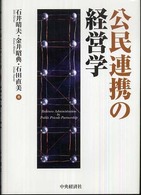- ホーム
- > 洋書
- > 英文書
- > Literary Criticism
Full Description
Reading literary texts in their historical contexts has been the dominant form of interpretation in literary criticism for the past thirty years. This collection of essays reflects on the origins of historicism and its present usefulness as a mode of literary analysis, its limitations and its future. The volume provides a brief history of the practice from its Renaissance origins, offering examples of historicist work that not only demonstrate the continuing vitality of this methodology but also suggest new directions for research. Focusing on the major figures of Shakespeare and Milton, these essays provide important and concise representations of trends in the field. Designed for scholars and students of early modern English literature (1500-1700), the volume will also be of interest to students of literature more generally and to historians.
Contents
Acknowledgments; Introduction Ann Baynes Coiro and Thomas Fulton; Part I. Historicism and Its Discontents: 1. Has historicism gone too far: or, should we return to form? Andrew Hadfield; 2. Theory and practice in historical method Michael McKeon; 3. Limiting history Marshall Grossman; Part II. Historicism and Theology: 4. The politics of Renaissance historicism: Valla, Erasmus, Colet, and more Thomas Fulton; 5. Historicizing satisfaction in Shakespeare's Othello Heather Hirschfeld; Part III. Dramatic Histories: 6. The new presentism and its discontents: listening to Eastward Ho and Shakespeare's Tempest in dialogue Paul Stevens; 7. In great men's houses: playing, patronage, and the performance of Tudor history Lawrence Manley; Part IV. Milton and the Problems of History: 8. Medea's dilemma: politics and passion in Milton's divorce tracts Sharon Achinstein; 9. Milton, Foucault, and the new historicism Martin Dzelzainis; Part V. Gendering Historicism: 10. 'You shall be our generalless': fashioning warrior women from Henrietta Maria to Hillary Clinton Laura Knoppers; 11. War-times: seventeenth-century women's writing and its afterlives Erin Murphy; Afterword Nigel Smith.







